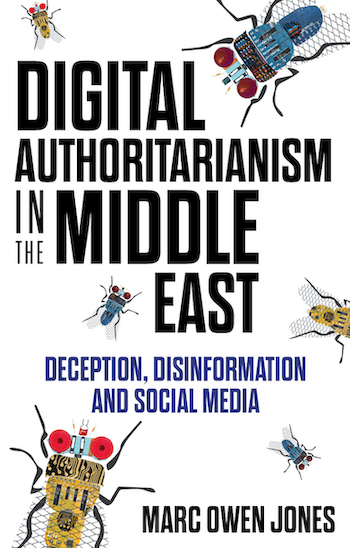Digital authoritarianism: The rise of electronic armies in the Middle East

For years, promotional videos of humanoid robots created by the US engineering firm Boston Dynamics have fuelled speculation and alarm over the potential for a future army of automatons. With eerie precision, the robots are shown running, jumping and practising parkour. In some ways, they seem uncannily human; in other ways, they are most decidedly not.
Drones have already brought a disturbing element of detachment to the business of warfare, as armies can now deploy bombs with the touch of a button from a computer console thousands of miles away. Could the next frontier include ground skirmishes fought by competing robot armies?
Better enforcement of non-English-language disinformation is also needed if the online sphere is ever to escape the clutches of what he terms 'digital Orientalism'
In the world of online warfare, we have already reached that point, as Marc Owen Jones chronicles in his new book, Digital Authoritarianism in the Middle East: Deception, Disinformation and Social Media.
Marshalled by states such as Saudi Arabia and the UAE, social media bot armies lie in wait, ready to attack dissident viewpoints and spread nationalistic propaganda far and wide. The Silicon Valley firms with unprecedented access to our data have so far failed to quash this electronic assault.
Jones explores how, over the past decade, the “techno-optimism” of the 2011 Arab Spring swiftly gave way to the rise of digital authoritarianism, by which Gulf states use social media “as a tool of counter-revolutionary repression”. The proliferation of Twitter bots has greatly expanded the reach of disinformation, while troll networks are deployed to intimidate opponents and hijack important political debates.
New MEE newsletter: Jerusalem Dispatch
Sign up to get the latest insights and analysis on Israel-Palestine, alongside Turkey Unpacked and other MEE newsletters
“Manipulating social media to mask criticism of Saudi has become a defining aspect of [Mohammed bin Salman]’s messianic vision,” Jones writes. Indeed, one of the crown prince’s top aides, Saud al-Qahtani, was nicknamed the “Lord of the Flies” for his alleged role in controlling thousands of bots and trolls across Arabic social media.
The Gulf's 'post-truth moment'
The 2017 Gulf diplomatic crisis marked “a watershed in the region’s post-truth moment”, Jones notes, as the blockading countries - Saudi Arabia, the UAE, Egypt and Bahrain - launched an unprecedented disinformation operation to justify their anti-Qatar campaign. The use of public relations firms, along with bots and trolls, created a false perception of popular hostility towards Doha and its alleged partners in the newly invented “axis of evil”, which included Turkey and the Muslim Brotherhood.
While Saudi lobbyists established a propaganda site to promote anti-Qatar disinformation, often painting the country’s economy in a negative light, electronic soldiers worked diligently to ensure that hashtags critical of Qatar became trending topics, Jones explains.
The Gulf crisis was a comprehensive deception operation initially sparked by a story on Qatar’s state-run news agency, QNA, in which the country’s emir was quoted as praising Hamas, Hezbollah and Iran. Doha maintains the site was hacked as a pretext to justify the ensuing blockade.
Jones highlights the preparation and coordination that went into this operation, pointing out that several days before news broke of the emir’s alleged comments, a hashtag began trending on social media: “Qatar the bankroller of terror”.
“The Gulf crisis is perhaps one of the first examples of a political conflict initiated and sustained by a multi-levelled cyber and disinformation operation,” he says.
His book catalogues scores of other examples in which Gulf states have deployed online armies as regime defenders, from swarms of tweets praising Saudi-aligned forces in an effort to distract from criticisms over violations in Yemen, to bots spamming the Jamal Khashoggi hashtag a year after his murder “with irrelevant content talking about how expatriate workers enjoyed working in Saudi”.
Up to 91 percent of Twitter accounts sharing posts by Emirati leader Mohammed bin Zayed are fake, Jones notes, citing his own extensive analysis.
Combatting disinformation
How to combat this assault remains an open question. While Twitter periodically suspends bots promoting Saudi and Emirati propaganda, the electronic flies quickly resurface. At the same time, Saudi Arabia is a prominent investor in Silicon Valley, fuelling concerns over how it might use this influence: “This perception of social media companies operating in the service of despots is felt acutely in the region,” Jones writes.
In 2020, Reporters Without Borders designated Saudi Arabia’s “electronic brigade”, a network of pro-regime bots and trolls producing more than 2,500 tweets a day, as one of the world’s top 20 digital predators. Riyadh has even managed to infiltrate Twitter headquarters, sending spies to work at the company and gather sensitive information.
Today, the advance of artificial intelligence looms over the future of digital authoritarianism, as Jones raises the spectre of AI churning out endless streams of propaganda: “With few ethical safeguards to prevent such a phenomenon, we are entering an alarming new phase where regimes and rulers can project deception to massive audiences.”
The notorious case of the “fake journalists” - in which a mysterious network of at least 19 supposed analysts, none of whom actually existed, placed dozens of op-eds about the Middle East in around 50 media outlets - highlights the potential extent and reach of deception operations, along with the difficulty of combatting them in an era of shrinking journalistic resources.
Jones’s book paints a bleakly accurate picture of the current digital landscape, and there is no quick fix. Stronger verification tools, such as third-party authenticators to confirm people are real before they are allowed to open a social media account, could help stem the influx of bots - but Jones acknowledges the attendant privacy concerns of such a scheme. Better enforcement of non-English-language disinformation is also needed if the online sphere is ever to escape the clutches of what he terms “digital Orientalism”.
While unsettling, Digital Authoritarianism in the Middle East is required reading for anyone concerned about the ascendancy of electronic armies and their ongoing assault on our politics and public discourse.
The views expressed in this article belong to the author and do not necessarily reflect the editorial policy of Middle East Eye.
Middle East Eye delivers independent and unrivalled coverage and analysis of the Middle East, North Africa and beyond. To learn more about republishing this content and the associated fees, please fill out this form. More about MEE can be found here.







